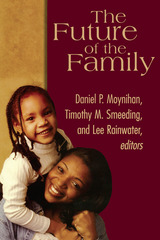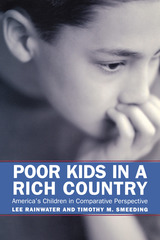2 books by Rainwater, Lee

The Future of the Family
Daniel Patrick Moynihan
Russell Sage Foundation, 2004
High rates of divorce, single-parenthood, and nonmarital cohabitation are forcing Americans to reexamine their definition of family. This evolving social reality requires public policy to evolve as well. The Future of the Family brings together the top scholars of family policy—headlined by editors Lee Rainwater, Tim Smeeding, and, in his last published work, the late Senator Daniel Patrick Moynihan—to take stock of the state of the family in the United States today and address the ways in which public policy affects the family and vice versa. The volume opens with an assessment of new forms of family, discussing how reduced family income and lower parental involvement can disadvantage children who grow up outside of two-parent households. The book then presents three vastly dissimilar recommendations—each representing a different segment of the political spectrum—for how family policy should adapt to these changes. Child psychologist Wade Horn argues the case of political conservatives that healthy two-parent families are the best way to raise children and therefore should be actively promoted by government initiatives. Conversely, economist Nancy Folbre argues that government's role lies not in prescribing family arrangements but rather in recognizing and fostering the importance of caregivers within all families, conventional or otherwise. Will Marshall and Isabel Sawhill borrow policy prescriptions from the left and the right, arguing for more initiatives that demand personal responsibility from parents, as well as for an increase in workplace flexibility and the establishment of universal preschool programs. The book follows with commentary by leading policy analysts Samuel Preston, Frank Furstenberg Jr., and Irwin Garfinkel on the merits of the conservative and liberal arguments. Each suggests that marriage promotion alone is not enough to ensure a happy, healthy, and prosperous future for American children who are caught up in the vortex of family change. They agree that government investments in children, however, can promote superior developmental outcomes and even potentially encourage traditional families by enlarging the pool of "marriageable" individuals for the next generation. No government action can reverse trends in family formation or return America to the historic nuclear family model. But understanding social change is an essential step in fashioning effective policy for today's families. With authoritative insight, The Future of the Family broadens and updates our knowledge of how public policy and demography shape one another.
[more]

Poor Kids in a Rich Country
America's Children in Comparative Perspective
Lee Rainwater
Russell Sage Foundation, 2003
In Poor Kids in a Rich Country, Lee Rainwater and Timothy Smeeding ask what it means to be poor in a prosperous nation - especially for any country's most vulnerable citizens, its children. In comparing the situation of American children in low-income families with their counterparts in fourteen other countries—including Western Europe, Australia, and Canada—they provide a powerful perspective on the dynamics of child poverty in the United States. Based on the rich data available from the transnational Luxembourg Income Study (LIS), Poor Kids in a Rich Country puts child poverty in the United States in an international context. Rainwater and Smeeding find that while the child poverty rate in most countries has been relatively stable over the past 30 years, child poverty has increased markedly in the United States and Britain—two of the world's wealthiest countries. The book delves into the underlying reasons for this difference, examining the mix of earnings and government transfers, such as child allowances, sickness and maternity benefits, unemployment insurance, and other social assistance programs that go into the income packages available to both single- and dual-parent families in each country. Rainwater and Smeeding call for policies to make it easier for working parents to earn a decent living while raising their children—policies such as parental leave, childcare support, increased income supports for working poor families, and a more socially oriented education policy. They make a convincing argument that our definition of poverty should not be based solely on the official poverty line—that is, the minimum income needed to provide a certain level of consumption—but on the social and economic resources necessary for full participation in society. Combining a wealth of empirical data on international poverty levels with a thoughtful new analysis of how best to use that data, Poor Kids in a Rich Country will provide an essential tool for researchers and policymakers who make decisions about child and family policy.
[more]
READERS
Browse our collection.
PUBLISHERS
See BiblioVault's publisher services.
STUDENT SERVICES
Files for college accessibility offices.
UChicago Accessibility Resources
home | accessibility | search | about | contact us
BiblioVault ® 2001 - 2024
The University of Chicago Press









